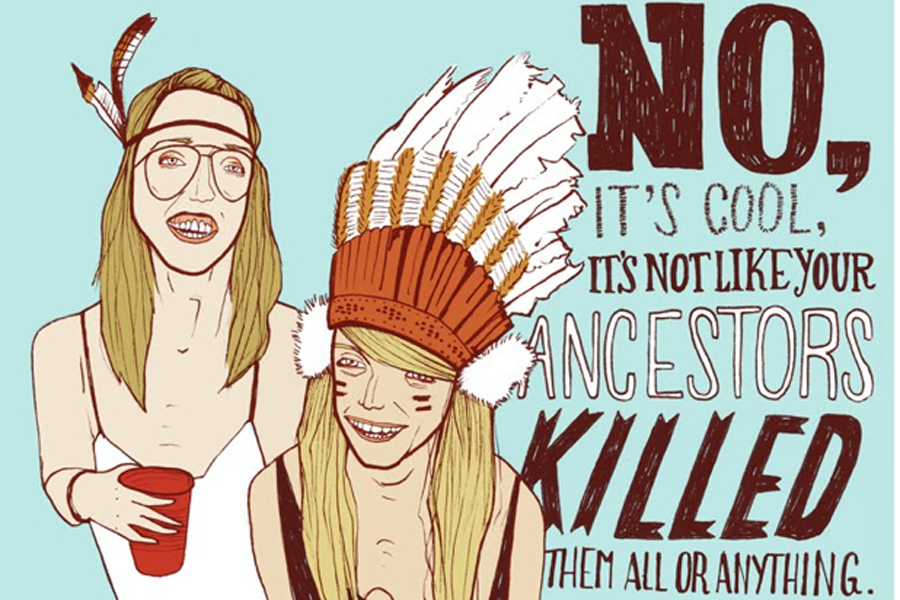Cultural Appropriation Suits Up for Halloween
From wearing Native American head dresses to Black Face, cultural appropriation runs rampant on this night of tricks and treats.
October 31, 2016
With Halloween right around the corner, many are shopping for their one-of-a-kind costume to make a statement at parties or to get a compliment from the generous people who give out candy on this treat of a holiday.
Once a costume is chosen, it ultimately sets the stage for what that person finds interesting or funny, and it also is a creative outlet for self-expression. If they choose a superhero, then they may like or relate to that character, or they might like wearing underwear on the outside of their clothes, who knows?
Yet, let’s say that this person decides that they want to be a Native American for Halloween, and this person is not in any way a Native American. What does that say about that person? For one, it shows that he/she is okay with culturally appropriating Native American religious tribal wear.
Cultural Appropriation is used to describe the taking over of creative or artistic themes, practices, or forms by one cultural group from another, not to be mistaken with cultural appreciation or cultural borrowing. Individuals who choose to disregard this “appropriation” are insensitive to the unique and sacred qualities of Native American culture. With that being said, cultural appropriation is not limited to Halloween, nor does it stop with Native American culture. It is seen in many forms in our society. From styles in fashion to hairstyles, cultural appropriation plays a huge role in our society as a whole.
To further explain cultural appropriation, let’s say there is a group of people who have been taken from their homes and are told to change their old ways and to listen to and do whatever their new leader says. With the new culture in place, they are now made fun of for their original traditions and culture and told that they are inferior. Fast forward a couple of years, and the same people who took them away from their culture start to wear, practice, change the name, and claim ownership over the same culture that they had deemed as “inferior.” But, now these “inferior” styles are deemed acceptable and stylish because the ‘superior’ class is wearing them.
Doesn’t this sound quite familiar? If it doesn’t, just look up any current fashion shows full of beautiful white women and men wearing styles and clothes such as cornrows (renamed to “boxer braids,” thanks to the Kardashians), dreadlocks, headdresses, kimonos, dashikis, bindis, and more. All of these are examples of styles associated with minority groups such as Indians, Native Americans, African, African-Americans, Japanese and many others.
This is outright offensive to the cultures that these styles were taken from because now, something that they value as definitive to themselves and their culture, has been heralded like a new song being played on the radio 24/7 until people are sick of it.
These appropriated cultures don’t consider these ‘hot styles’ as fads or the ‘next big thing.’ To those various cultures appropriated, this is something that has value and meaning to what they are as a people and what their culture represents collectively.
When society takes these cultural standards from those indigenous to them, and does not acknowledge the history of where they come from and what they mean, it’s ultimately taking us all a couple steps backwards in terms of making the world more inclusive and aware.
Even if all parties were made aware of the history of these appropriated cultures, there would still be the issue of how willing these cultures are to share, and to what extent. With this being said, there is no reason to let this form of appropriation continue.
A blatantly offensive example of cultural appropriation from an article on gloss.com that tells of how 13 parties at different colleges had white people bearing “black face” as a costume. This is all too common around Halloween and sorority/frat parties, where they practice the use of blackface and stereotyping of black dress and physical features associated with black genetics. Most of those who dress up like that find this to be harmless and funny. Yet to most people of African descent, these actions really hurt the progression black people who try to stray away from the stereotypes that have been keeping them down in society.
As the saying from Paul Mooney goes, “Everyone wants to be black, but no one wants to be black.” In essence, this sums up attitudes towards appropriating cultures however, in accordance to the saying, black culture especially.
Some people honestly don’t see an issue with dressing up as another culture that isn’t their own. Now let’s think about this for a moment. Yes, Halloween is the one time of the year where it is acceptable to completely change your identity for one night, yet at what cost are you willing to go to become someone else?
There are many ways to wear costumes that will get just as much attention as those offensive options without disrespecting someone’s cultural. So, in hopes of making this world a better place, let’s all make sure to pass the ethnic costume aisle in Party City and find some better alternatives.




Bre'Unna Lewis • Nov 30, 2016 at 9:02 am
I Like This Article.